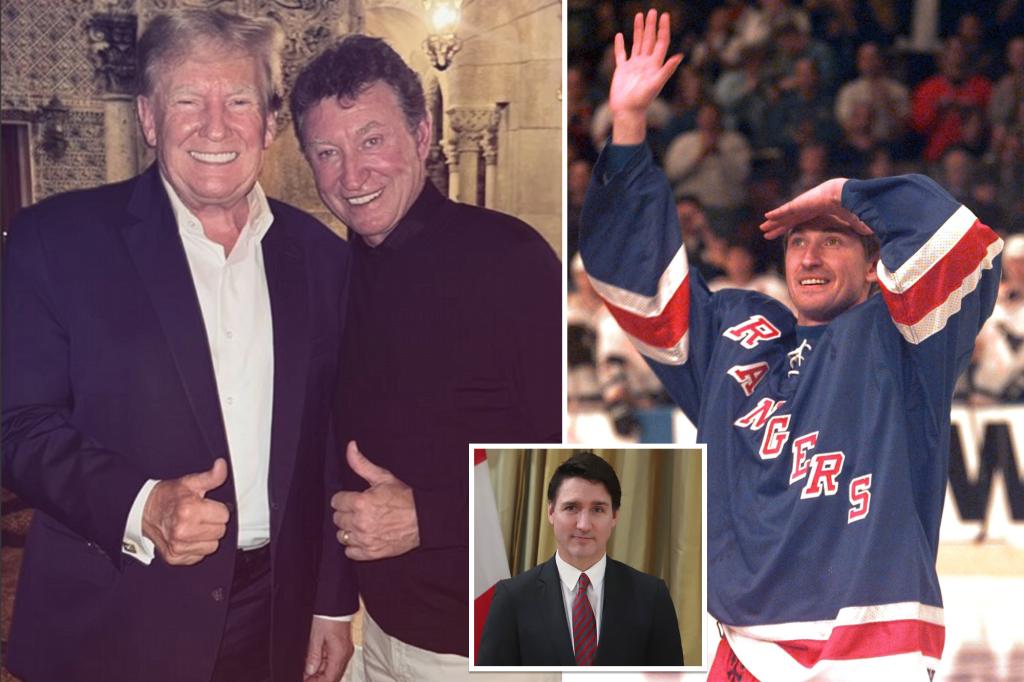Paragraph 1: Trump’s Provocative Proposal and Gretzky Endorsement
Former US President Donald Trump ignited a playful yet provocative exchange with Canadian Prime Minister Justin Trudeau, suggesting a radical shift in the North American political landscape. Trump, via his social media platform Truth Social, proposed that Canada become the 51st state of the United States, promising a substantial tax cut for Canadians should they agree. Adding an unexpected twist, Trump publicly urged hockey legend Wayne Gretzky to run for Canadian Prime Minister, or as Trump put it, "Governor of Canada," believing Gretzky would secure a landslide victory without even campaigning.
Paragraph 2: Trump’s Rationale for a US-Canadian Merger and Gretzky’s Reluctance
Trump’s rationale for this unconventional proposal stems from his long-held belief that Canada has been exploiting the US in trade deals. This perceived imbalance has fueled his repeated taunts directed at Trudeau, often referring to him as "Governor" and Canada as a potential US state. While Trump confidently predicted Gretzky’s political triumph, the hockey icon, according to Trump, expressed no interest in entering the political arena. This did not deter Trump, who then encouraged Canadians to initiate a "Draft Wayne Gretzky" movement, anticipating the spectacle it would create.
Paragraph 3: Taunts, Tax Cuts, and Military Protection: Trump’s Vision of Canada as a US State
Continuing his playful yet pointed commentary, Trump issued a "Merry Christmas" greeting to Trudeau, again using the "Governor" moniker. He reiterated his claim that Canadian taxes are excessively high and posited that becoming the 51st state would result in a significant tax reduction of over 60%. Furthermore, Trump envisioned a booming Canadian economy, predicting a doubling of business sizes and unparalleled military protection under the US umbrella. These assertions, presented with Trump’s characteristic blend of bravado and hyperbole, further fueled the ongoing banter between the two North American figures.
Paragraph 4: Trudeau’s Political Challenges and Looming Election
Meanwhile, Justin Trudeau, who has served as Prime Minister since 2015, faces growing political headwinds. Calls for his resignation have intensified, emanating not only from the opposition but also from within his own Liberal Party. Public dissatisfaction with rising prices and a housing crisis, issues that have escalated during Trudeau’s tenure, contribute to this pressure. Upcoming federal elections, scheduled before October 2025, present a significant challenge for Trudeau, with polls indicating a substantial lead for the Conservative Party.
Paragraph 5: A Mar-a-Lago Meeting and the Threat of Tariffs
Adding a layer of complexity to the US-Canada relationship, Trudeau met with Trump at Mar-a-Lago amidst Trump’s threat to impose a 25% tariff on Canadian imports. Trudeau reportedly cautioned Trump that such a measure would severely damage the Canadian economy. Trump, however, countered by questioning Canada’s economic viability without what he perceives as unfair trade practices, referencing the US trade deficit with Canada. It was during this meeting that Trump initially suggested Canada’s integration as a US state, coining the "Governor" nickname for Trudeau.
Paragraph 6: Gretzky’s Political Affiliations and Hockey Legacy
Wayne Gretzky, a Canadian icon and arguably the greatest hockey player of all time, has previously demonstrated political leanings, endorsing the Conservative Party and former Prime Minister Stephen Harper. While his political engagement has been limited to endorsements, his name recognition and national stature undoubtedly lend weight to Trump’s playful suggestion. Gretzky’s remarkable hockey achievements, including four Stanley Cups and a plethora of NHL records, cement his place as a national hero, further fueling the intrigue surrounding Trump’s hypothetical political draft.

